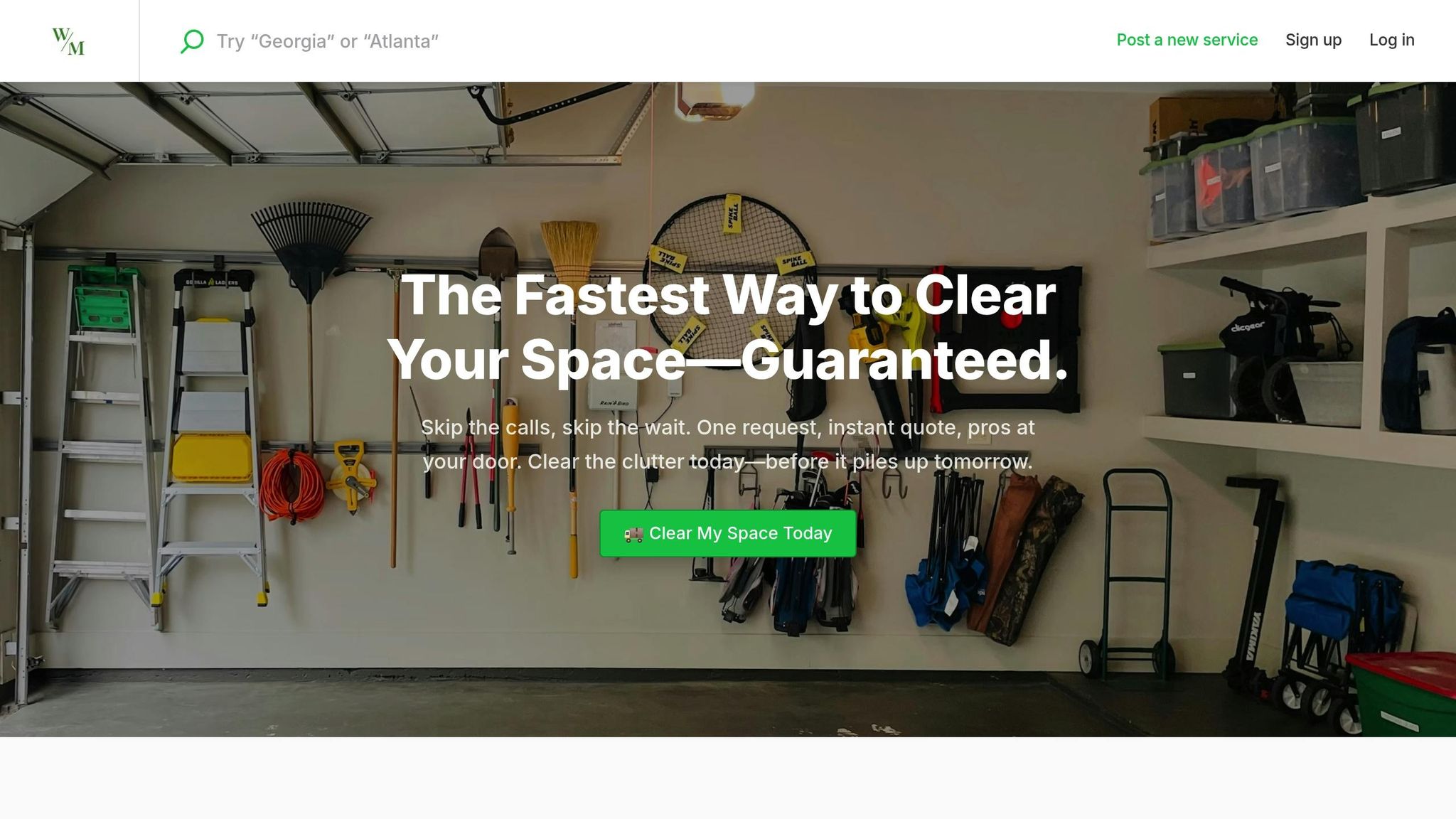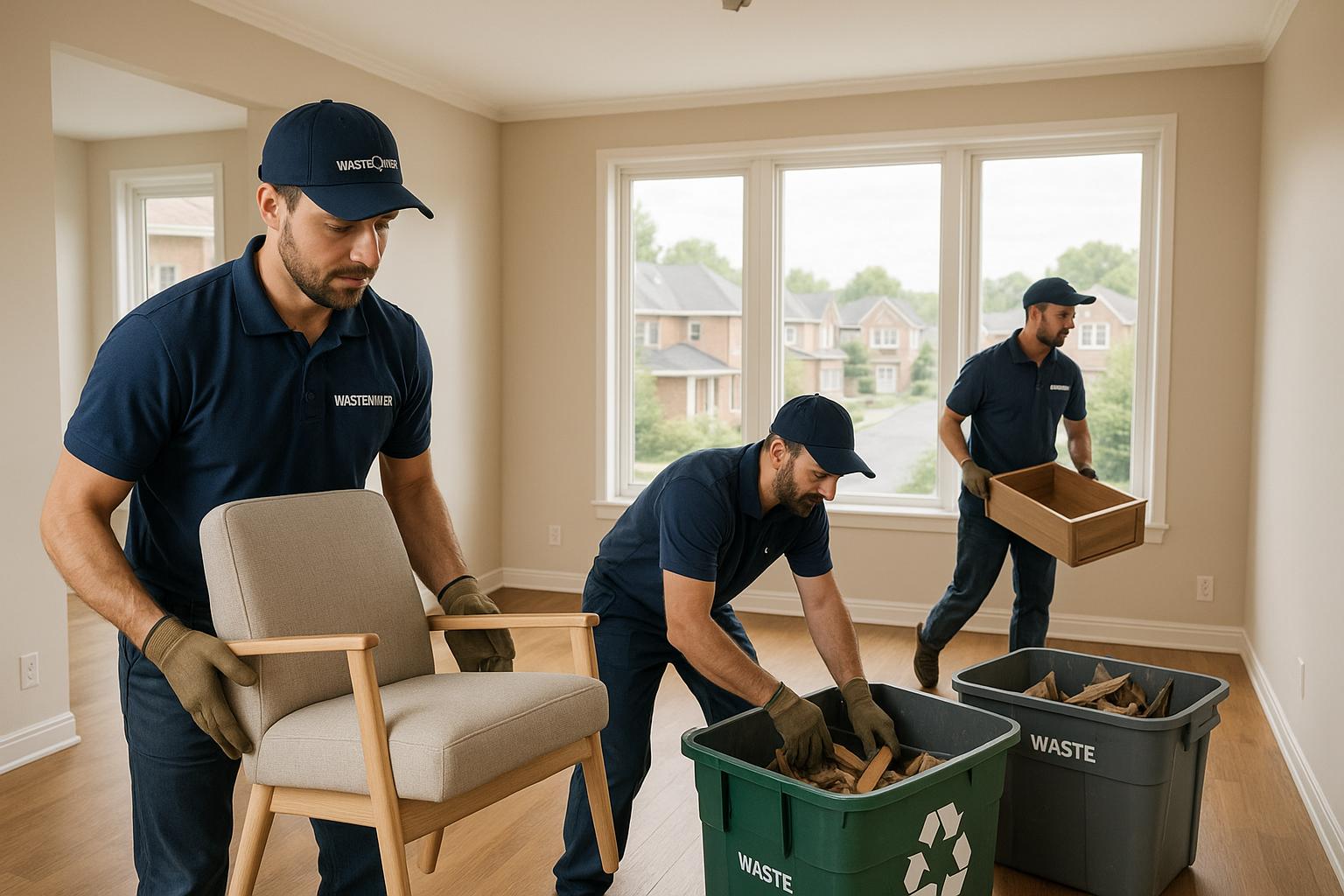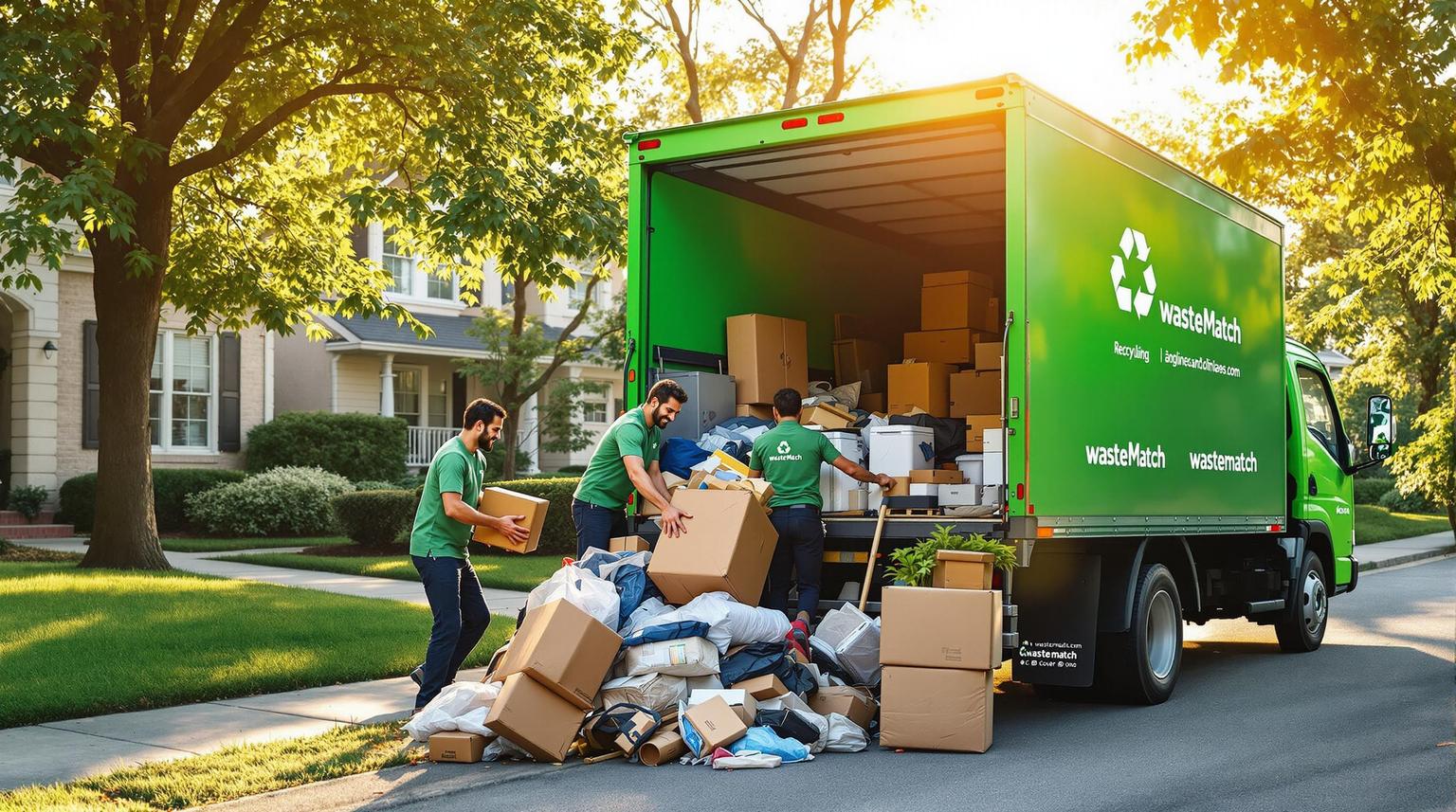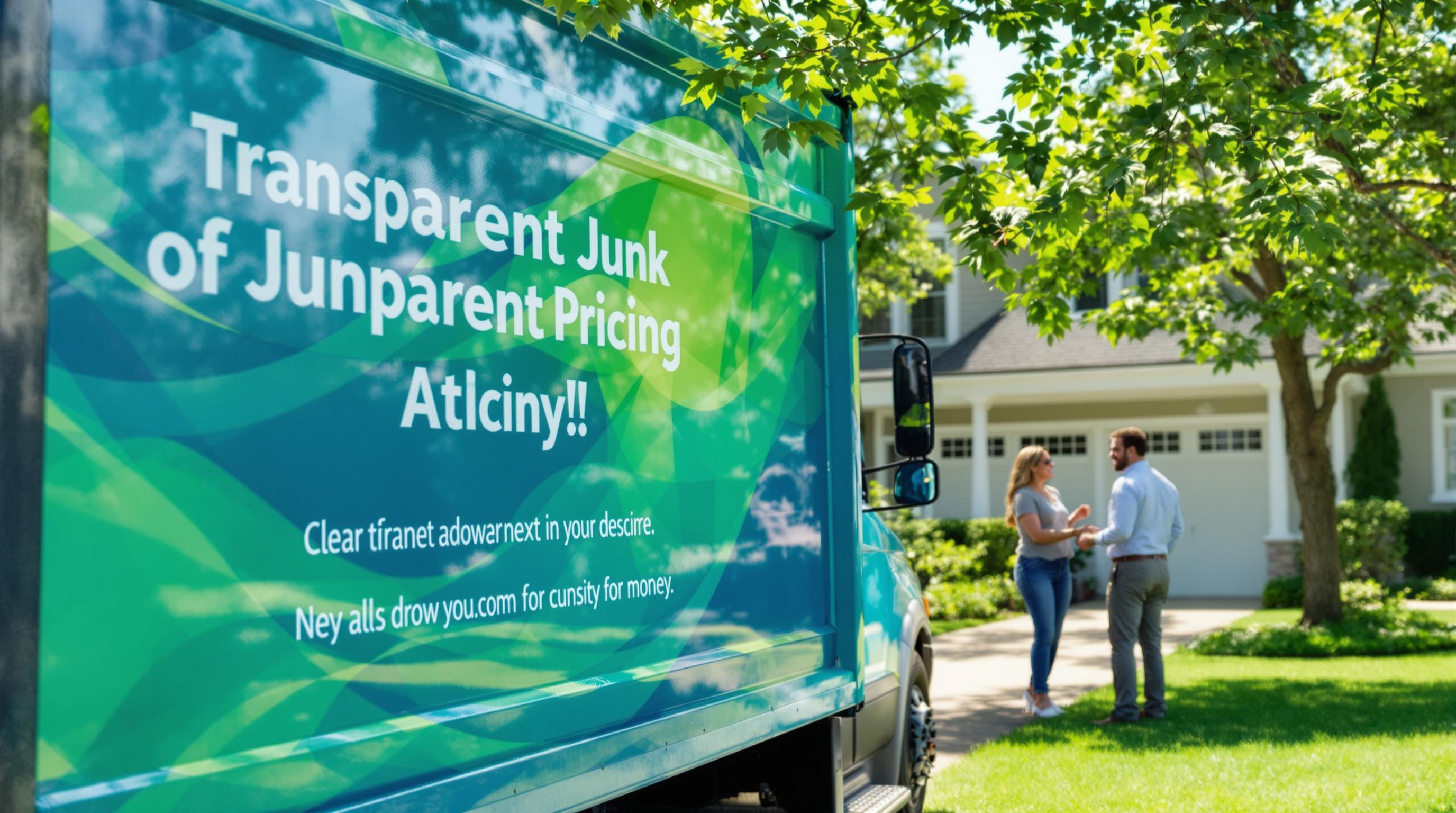Getting rid of waste shouldn’t break the bank. Whether you’re remodeling, cleaning out a garage, or tackling a construction project, dumpster rental costs can stack up fast. The good news? Finding budget-friendly options is easier than you think.
With prices ranging from $250 to $1,500 depending on size and location, knowing what to expect - and how to avoid surprise fees - can save you time and money. WasteMatch simplifies the process by connecting you to local haulers with clear pricing and flexible scheduling.
Here’s what you’ll learn:
- Average costs for different dumpster sizes
- How to avoid hidden fees like overage or permit charges
- Tips for picking the right size to keep costs low
Stop guessing. Start saving. Let’s make your waste removal hassle-free.
Fast & Affordable Dumpster Rentals! Dumpster in Hamden, CT
How Much Dumpster Rentals Cost in the U.S.
Setting a clear budget for dumpster rentals starts with understanding the pricing landscape. Costs can vary widely across the country, so knowing the typical price ranges and what influences them can help you better manage your waste disposal expenses.
Below, we break down the price ranges and the factors that impact these costs.
National Price Ranges and What Affects Them
Dumpster rental prices across the U.S. generally fall between $384 and $663 on average, though they can range from $286 to as high as $1,538, depending on various factors.
Here’s a quick look at common dumpster sizes and their price ranges:
| Dumpster Size | Price Range | Average Cost |
|---|---|---|
| 10 Yard | $250 - $450 | $395 |
| 20 Yard | $350 - $550 | $475 |
| 30 Yard | $420 - $748 | $575 |
| 40 Yard | $474 - $845 | $650 |
Where you’re located plays a big role in how much you’ll pay. Larger cities, especially on the East Coast, tend to have higher landfill fees, which can drive up rental costs. By contrast, smaller towns in the Midwest often see lower prices, though factors like fuel costs and demand still play a part.
Regional pricing differences are also influenced by landfill availability, the distance haulers must travel, local permit requirements, and competition among providers. In rural areas, while base rates might be lower, delivery fees can quickly add up due to the longer distances involved.
Other contributors to price fluctuations include the type of project, seasonal demand, and how quickly you need the dumpster.
It’s also worth noting that hidden fees can significantly increase your final bill.
How to Avoid Hidden Fees
Hidden fees can turn what seemed like an affordable rental into a costly surprise. The best way to avoid this is by fully understanding what’s included in your quote and what could lead to extra charges.
Before signing an agreement, carefully review the terms and conditions. Most rental companies provide a contract that spells out the details, including services, restrictions, and any additional fees. If you’re booking over the phone, ask the representative to go over these terms with you.
Here are some common hidden fees to watch out for:
- Overage Charges: These kick in if you exceed the dumpster’s weight limit or fill it beyond capacity. Heavy materials like concrete, dirt, or shingles can quickly push you over the limit, even in larger dumpsters. Be sure to ask about weight allowances upfront and consider a larger size if you’re dealing with dense materials.
- Extended Rental Fees: Most rentals are for 7 to 14 days. If you need the dumpster longer, daily extension fees may apply.
- Permit Fees: If you’re placing the dumpster on a street, you might need a permit. While some companies handle this for you, the cost of the permit is often your responsibility.
- Prohibited Item Fees: Disposing of restricted items like electronics, hazardous chemicals, or appliances can incur extra charges because these items require special handling.
- Fuel Surcharges and Delivery Fees: Some companies include these in the overall quote, while others list them separately. Either way, they can add to your total cost.
To avoid surprises, ask questions like, “What’s the total cost, including all fees?” and “What could lead to additional charges?” Request a written estimate that breaks down every potential fee. This way, you can compare providers more effectively and plan your budget with confidence.
Picking the Right Dumpster Size for Your Project
Selecting the right dumpster size is a practical way to keep rental costs in check. Picking the wrong size can lead to extra fees, weight overages, or even needing a second dumpster. By understanding the volume and density of your project's waste, you can make a choice that saves money and avoids unnecessary complications.
Accurate calculations of waste volume and weight are essential. Aligning the dumpster size with your specific debris needs ensures you won’t pay for unused space or face unexpected overage charges.
Dumpster Size Guide by Project Type
Different projects come with predictable waste volumes, which can simplify the process of choosing the right dumpster size. Here’s a breakdown of common projects and their typical requirements:
- Kitchen Renovations: For every 100 square feet, expect 20–30 cubic yards of debris. A 20-yard dumpster usually works for standard kitchen remodels, but larger projects may need a 30-yard container.
- Bathroom Remodels: Standard bathrooms generate about 15–25 cubic yards of waste. A 20-yard dumpster is a typical choice, while smaller updates or powder room projects might only require a 10–15 yard option.
- Roofing Projects: Waste depends on the size of the roof and the number of shingle layers. Generally, roofing produces 1–3 cubic yards of debris per 100 square feet. A single-story home with one layer of shingles often needs a 20-yard dumpster, while larger or multi-layered projects may call for a 30-yard option.
- Whole-House Cleanouts: Waste volume varies widely depending on the home’s size and contents. Modest cleanouts might fill a 20-yard dumpster, but larger homes with extensive items can require 30–40 yard containers.
- Construction and Demolition Projects: Debris volume can expand 3–4 times after demolition. Even a small demolition job for one room may generate enough waste to fill a 20-yard dumpster.
To estimate your needs, measure the length, width, and height of your debris in feet, multiply those dimensions together, and divide by 27 to calculate the cubic yards required. For demolition, don’t forget to factor in the expansion of materials.
Once you’ve determined the volume, it’s equally important to consider weight limits to avoid additional charges.
Why Size and Weight Matter
Choosing the right dumpster size involves more than just volume - it’s also about weight. Exceeding weight limits can lead to costly overage fees, especially with heavy materials like concrete, dirt, or shingles.
For example, a 10-yard dumpster might be sufficient for lightweight materials like drywall and cabinets during a kitchen remodel. However, if you’re disposing of heavier materials, even a 20-yard dumpster could exceed weight limits, resulting in extra charges.
Underestimating your needs can lead to additional pickups, extended rental periods, or fines for overflow. These costs are often higher than simply renting the correct size from the beginning.
On the flip side, consistently opting for oversized dumpsters means paying for space you don’t use. While larger containers prevent overage fees, they can unnecessarily inflate your project budget.
The goal is to find the right balance - a dumpster that can handle both the volume and weight of your debris. If you’re unsure, it’s always worth discussing your project with rental providers. Their expertise can help you avoid the pitfalls of choosing the wrong size and keep your project running smoothly.
sbb-itb-c7714ed
Simple Ways to Save on Dumpster Rentals
With a little planning and smart decision-making, you can trim down your dumpster rental costs without sacrificing quality. By understanding how pricing works and timing your rental thoughtfully, you can keep your expenses in check while ensuring your project stays on track. Poor planning, on the other hand, can lead to unnecessary charges. These tips will guide you through saving money with well-timed rentals, bundling services, and leveraging WasteMatch's helpful features.
Plan Your Rental Period Wisely
Timing is everything when it comes to managing rental costs. To avoid extra charges, make sure your project fits within the standard rental period. For example, if you're planning a home renovation, map out your timeline to avoid any extension fees. Scheduling your dumpster delivery and pickup during off-peak times can also help you save. If your project spans a longer period, ask about extended rental discounts instead of repeatedly paying for short-term rentals.
Combine Services for Maximum Savings
Bundling tasks into one rental can be a straightforward way to cut costs. Instead of renting separate dumpsters for different phases of a project, try combining tasks that happen around the same time. For instance, if you're remodeling your kitchen while also clearing out the garage, a single dumpster can handle both jobs, saving you from extra delivery and pickup fees. This approach works well for seasonal cleanouts or for contractors managing multiple projects in the same area, where bulk pricing might be an option.
Take Advantage of WasteMatch's Features

WasteMatch offers tools and features designed to help you save money on dumpster rentals. With their "⚡ Quotes in Minutes" feature, you can quickly compare prices from multiple verified providers, ensuring clear and upfront pricing. Their "Dumpster Rentals: Flexible drop-offs for home projects or commercial jobs" option lets you align delivery times with your project schedule, helping you avoid unnecessary charges. Plus, the "🛡️ Verified Pros Only" guarantee means you'll be working with trusted professionals, reducing the risk of surprise fees.
Finding Good Providers with WasteMatch
Finding a dependable dumpster rental provider doesn’t have to be a challenge. Knowing what to look for can help you secure a service that aligns with your budget and project needs.
What to Look for in a Dumpster Rental Provider
When comparing dumpster rental companies, focus on the basics that distinguish trustworthy providers from the rest. Start by confirming that the company has proper licensing and insurance for both delivery and pickup. A reputable provider will have no issue sharing their credentials and proof of coverage.
Clear and upfront pricing is another key factor. Good companies provide detailed quotes that outline all costs, including delivery, pickup, disposal fees, and any potential overage charges. They’ll also make sure you understand weight limits and material restrictions before you commit.
It’s worth prioritizing companies with a local presence and strong customer reviews. Providers who have been serving your area for years are likely familiar with local disposal regulations and have established relationships with nearby landfills and recycling centers. This knowledge often translates to smoother service and better pricing.
Flexible scheduling is a must, especially for projects with tight deadlines. Top providers offer same-day or next-day delivery when possible and adapt to your timeline, rather than locking you into rigid pickup schedules.
Lastly, consider their approach to waste disposal. Companies that emphasize recycling and responsible disposal methods show a commitment to reducing landfill waste. This kind of attention to detail is often a sign of overall quality service.
The WasteMatch Advantage
These criteria are at the heart of what WasteMatch offers. WasteMatch takes the uncertainty out of the process by connecting you with verified professionals who have been rigorously vetted. This ensures you’re working with legitimate, dependable providers who meet strict quality standards.
What makes WasteMatch stand out is their dedication to quality control. As they state:
"Every hauler is vetted and held to our WasteMatch standard".
This means you’re not just matched with any available provider - you’re connected with professionals who have proven their reliability, proper licensing, and customer-focused service. By choosing verified providers, you can keep your project on track and avoid unexpected issues.
Whether you’re renting a dumpster in a small Montana town or downtown Miami, WasteMatch links you with local experts who understand your area’s regulations and requirements. This tailored approach saves you time and minimizes the chances of costly mistakes or service disruptions.
Conclusion: Simplify Your Dumpster Rental with WasteMatch
Renting a dumpster doesn’t have to be complicated or expensive. The key steps are simple: compare quotes from several providers, pick the right size for your needs, understand all costs upfront, and plan your rental timeline carefully. In fact, studies show that shopping around can lower your rental costs by as much as 30%.
WasteMatch makes this process even easier by connecting you with trusted providers who offer customized quotes tailored to your project - whether you’re clearing out a home in suburban Texas or managing construction waste in downtown Seattle.
With WasteMatch, you’ll avoid common pitfalls like oversizing or exceeding weight limits. Their size recommendations and transparent pricing ensure you only pay for what you need. Plus, they break down all fees and weight limits clearly, so there are no surprises when it’s time to pay.
Every provider listed on WasteMatch is carefully vetted, giving you more than just competitive rates - you also get peace of mind. Providers are checked for proper licensing, insurance, and customer service standards, so you can focus on your project without worrying about delays or hidden charges.
FAQs
How do I choose the right dumpster size for my project to avoid unnecessary expenses?
Choosing the right dumpster size can make a big difference in keeping your project on budget. Start by figuring out the type and volume of waste you'll be dealing with. For instance, a 20-yard dumpster works well for tasks like home cleanouts or smaller renovation projects. On the other hand, bigger jobs, such as roofing or construction, might call for a 30- or 40-yard dumpster. If you're on the fence about which size to pick, opting for a slightly larger one can be a smart move - it gives you enough room and helps you avoid overage fees. A little planning upfront can save both time and money!
How can I avoid unexpected fees when renting a dumpster?
To sidestep unexpected costs when renting a dumpster, a little planning goes a long way. Start by choosing the correct dumpster size for your project. Picking one that's too small might lead to overage fees if you exceed the weight or volume limits. Be mindful not to overload the dumpster, and always keep materials below the fill line to avoid extra charges.
It's also wise to have a clear conversation with the rental company about all potential costs. Ask about fees for longer rental periods or handling specific types of waste. Stick to the agreed rental period to dodge late fees, and double-check any rules about prohibited items to steer clear of fines. These simple steps can help keep your project on track and your budget intact.
How does WasteMatch connect me with affordable and trustworthy dumpster rental providers?
When you need a dumpster rental, WasteMatch takes the hassle out of the process by connecting you with reliable and affordable providers. They partner only with companies that have a proven track record for quality and dependable service. Whether you're tackling a home cleanout, a renovation, or a construction project, they offer a variety of options to suit your specific needs.
Every provider in their network is carefully vetted to ensure you get competitive pricing without sacrificing quality. This means you can save money while enjoying efficient service and the confidence that everything will go smoothly.


